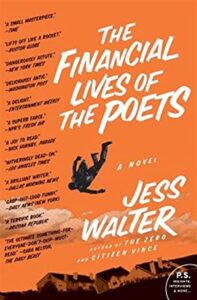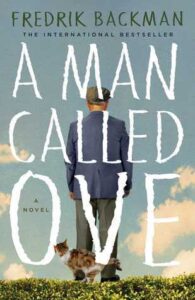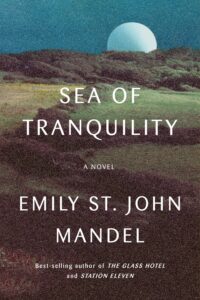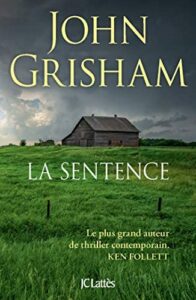
The Abbey Bookshop in Paris
Cars are not nouns. They’re adjectives. — Fredrik Backman
By PJ Parrish
The best thing about vacationing in a foreign country is not being able to understand what’s on television. During our month-long stay in France, I was limited to the reality show Master Chef in French. A deflated souffle is the same in any language — pack your knives, knave!
So I got to read. A lot. I don’t use Kindles or tablets so I have to rely on tree books. I took three but burned through them fast. Restocked at the Abbey Bookshop in Paris, but still ran out of good stuff by the time we got to Provence. Luckily, our rental house had bulging bookshelves. Unluckily, most of it was non-fiction or Italian novels. Including Stephen King’s L’Ombra dello Scorpione. (No clue…)
I read 22 books in three weeks. Some were as great as the Basque Pikorra cheese we had. A few were as forgettable as Velvetta. One I tossed into the pool (yes, I will name names). Another, a bestseller from a great series, put me, and my dog, to sleep. Most entertained me. And almost all of them taught me something about this maddening thing we call writing.
Here’s a sampling and what I learned from each. Apologies for the long post today, and I forgive you if you skim read.

The Financial Lives of the Poets. By Jess Walter. Matthew Prior quits his newspaper job to gamble everything on a quixotic notion: a web site devoted to financial journalism in the form of blank verse. Before long, he’s in debt, six days away from losing his home — and spying on his wife’s online flirtation. Then, one night on a desperate two a.m. run to 7-Eleven, he falls in with some local stoners. Havoc follows.
I loved this book. It’s gasp-out-loud funny. Surprising at every turn. Darkly satirical yet achingly tender. You ever get a book you start to read more slowly because you don’t want it to end? This was it for me. I’ve read only one other Walter book, Beautiful Ruins, his paean to crazy love starring a weird Italian trying to build a golf course on a Ligurian cliff, Burton and Taylor trysting during Cleopatra, and a doomed starlet. Richard Russo called it “an absolute masterpiece.” Walter has written only 10 novels, snapped up countless awards, and won the Edgar for his crime novel Citizen Vince. (I’m off to get it today).
THE LESSON. Trust in your ability to be original. Don’t be a pale copy of someone else. Take chances. The two Walter books I read are blazingly different yet both quirky and deeply affecting. As Walter told the New York Times: “I judged a contest once — 200-some books — and another judge said: ‘You’ll be surprised how many good books there are, and how few great ones.’ Indeed, there were many ‘well-written books’ but the great ones stood out for other qualities: audacity, originality, thematic weight. I think writers sometimes fall in love with this idea of “the gorgeous sentence” and it becomes their only definition of writing. But other elements are also part of writing; to me, an elegant narrative shape is every bit as beautiful as great prose.” Amen to that.

Me and Archie and Ian Rankin.
A House Of Lies. By Ian Rankin. Retired detective John Rebus gets pulled back in when a skeleton of a private eye is found in the woods. His old friend, Siobhan Clarke is assigned to the case.
I’ve enjoyed other Rebus novels and was eager to sink back into this evergreen series. But the pacing was glacial and too many characters are introduced too early — except for Rebus who shows up late for his own party. The Scots are said to be folks of few words. Not here. The cop banter is numbing. It’s the 22nd outing for Rebus, so maybe the old fellow was a bit tired. I don’t know. I gave up on page 72. Very put-downable.
THE LESSON: Keep the focus in the early pages on your protag. Establish a compelling fissure in the norm immediately. Don’t crowd your stage with minor characters too soon. Make your dialogue advance the plot — less talk, more action. And never forget that you’re only as good as your last book.

A Man Called Ove. By Fredrik Backman
Ove, an ill-tempered, isolated retiree who spends his days enforcing block association rules and visiting his wife’s grave, has finally given up on life just as an unlikely friendship develops with his boisterous new neighbors.
I plucked this off the shelf not expecting much. The ho-hum opening line: Ove is fifty-nine. He drives a Saab. And the Ove character is just really nasty and off-putting. Plus it’s set in Sweden. But this quirky, funny, dark book unfolds with grace and perfect pacing, toggling between the present and Ove’s childhood. It’s heartbreaking and ultimately life-affirming. I’ve since found out it’s a word-of-mouth international bestseller. (where have I been?) And it will be released this Christmas as a movie starring — who else? — Tom Hanks (renamed as Otto from Pittsburgh). I love it when I stumble upon a book having no expectations and then am blown away. Oh, as for that opening line: The author says his editor all but demanded that he change it — you need something juicier, editor said. Backman fought for the Saab line.
The Lesson: Yes, an unlikeable character can carry a story. But you must, as Fredrik Backman does with Ove, give your hero a sturdy and believable arc, allowing the plot and other characters to affect his development. Other lessons: Pay attention to your other cast members. Each one in this book has an impact — some small some major — on Ove’s life. Each is rendered with love and vividness.
A final lesson: Don’t agree with everything an editor tells you to do. Opening lines, at their best, telegraph to your readers the thematic heart of your story. The opening line about the Saab is a splendid example of what we here call “the telling detail.” The Saab comes to symbolize Ove’s very soul. Backman talks about this in a wonderful essay he wrote called “Something About a Saab”: Quote: “It’s a pretty weird process, writing a book…a lot of compromises are made, sometimes between the writer and the publisher…but mostly between the writer and the writer. Ideas are edited, dialogues are shortened, characters are fired. Editors like to call this process killing your darlings. If there is one thing in this whole novel process that wild horses and armed men could have never convinced me to get rid of it was that second sentence: He drives a Saab. I could have written twenty pages and never gotten as much said about Ove as with those four words…Above all you know exactly what men who drive Saabs would have said about us. Because cars are not nous. They’re adjectives.”
Which is why, when I finally divorced my first husband, I got rid of my Honda Accord and bought a TR6 convertible.

Sea of Tranquility and Last Night In Montreal. By Emily St. John Mandel.
You might know from my previous posts that I’m a big fan of this writer. Her Station Eleven and Glass Hotel are two of the best books I’ve read in the past five years. I splurged on a hardcover of her latest Sea of Tranquility. It involves time travel, love, and plague that takes the reader from Vancouver Island in 1912 to a dark colony on the moon five hundred years later, unfurling a story of humanity across centuries and space. Loved this book! So I grabbed a used copy of her first book Last Night in Montreal at the Abbey Bookshop, ready to be entranced again. Oh brother, what a hot mess. The main character Lilia was abducted in the night by her father. As an adult, Lilia wanders from city to city, lover to lover, eluding a PI who’s obsessed with finding her. There’s a second character Eli, also obsessed with her, trailing her like a sick puppy. Lots of dark hints about a tortured childhood, a bad mom, and such. But mainly, it’s Lilia and Eli whining about their useless lives, as the detective — totally without motivation –lets his relationship with his own daughter wither and die.
The Lessons: Sea of Tranquility taught me that you can indeed whiplash readers through time but only when you’ve got the firmest grasp of your craft. Mandel never gets you confused. Plus she’s a master at world-building. I totally believed her scenes set on the moon colonies. Last Night in Montreal taught me that SOMETHING HAS TO HAPPEN. (Boy, you haven’t heard that here before, right?) And that whining isn’t deep. It’s just boring. Oh, and that big secret about her bad childhood? A big meh at the end. Lesson: Don’t set up some juicy plot tease and then not follow through. (Montreal is the book that landed in the pool.) And a final lesson for you all just starting out: Yes, your first book might be flawed but put it behind you and keep moving forward. There’s maybe a Station Eleven — it won the PEN and National Book Award and was an HBO series — waiting to claw its way out of you.

La Sentence By John Grisham
By my final three days, I had exhausted the rental house’s English novels. There was just John Grisham left. Now, I’m not a Grisham fan. I concede he’s a good storyteller but his writing sounds clunky to my ear. Also, this book was in French. It was called La Sentence, a translation of Grisham’s 2018 family saga cum mystery cum war novel The Reckoning.
Thanks to years of adult ed and Babbel, I have a passable reading knowledge of French. So, dictionary in hand, I cracked open La Sentence, ready for a long slog. The story hooked me immediately. It is 1946 and wounded war hero Pete Banning has returned to his family cotton business in small town Mississippi. Page one: On a cold morning, Banning wakes before dawn and decides today is the day he will kill someone. He knows it will change the lives of everyone he cares for, but “the killing became as inevitable as the sunrise.”
I’ve tried to read French novels before — mainly Georges Simenon’s Maigret series — but the native language’s nuances frustrated me. But this was easier reading, maybe because it is so plot-driven. Also, I began to wonder if Grisham’s translator had added something, making the description and emotion more musical. When I got home, I got a used copy of The Reckoning in English and compared the two.
Take this line in the French version, from a scene where Banning is heading toward town, surveying the cotton fields and workers as he drives.
Les fleurs de coton, emportées par le vent, saupoudraient la route derrière les charrettes.
Here is how I translated it (and checked it via Google):
The cotton flowers, carried away by the wind, powdered the road behind the carts.
But here is how it appeared in The Reckoning (original English) as Grisham actually wrote it:
Cotton blown from the trailers littered the shoulders of the highway.
Note the difference in word choice: “flowers” instead of cotton balls. “carried away by the wind” instead of “blown” and “littered.” And there’s the use of that verb saupoudre, which in French is used most often to describe powdering a cake with white sugar.
THE LESSON: Word choices matter. Given his massive success (and The Reckoning was well reviewed), maybe Grisham needn’t worry about finding the great word or well-turned phrase. But given this book’s sad opening and almost elegiac tone, I wish he had tried harder to give Pete Banning a better soundtrack. I’m going to finish the book, but sticking with the French version. I like a little powdered sugar with my plots.
So, what have you all been reading lately? And what did you learn from your reading that helped you as a writer?

I borrowed “Dark Rivers of the Heart,” or “DROTH,” from one of those tiny book houses. Good title: three power words. Author: Dean Koontz. Should be good. That was months ago, but I’ve only made it to Page 39. Why?
Well, it’s a bedtime read, so usually only a few pages are enough to send me to Dreamland. But DROTH accelerates the process. Poetry begins the insomnia cure:
“Tremulous skeins of destiny
flutter so ethereally
around me⸺but then I feel
its embrace is that of steel.
“⸺The Book of Counted Sorrows”
Percy Dovetonsils sashays to mind. I turned to Page 3, anyway.
Shades of Bulwer-Lytton! DROTH opens with a description of a dark and stormy night! Down the page, Spencer’s dog ponders the eternal canine whys and wherefores for three paragraphs, ending with: “Or perhaps Rocky associated the dwindling highway behind them with the past. He had good reason not to dwell on the past.” Some tension begins on Page 14; the grenade drops on Page 18.
It’s 5 a.m. I think I’ll go back to bed and read another few soporific pages of DROTH.
Omg….Percy Dovetonsils. I ADORED him. Thanks for the memory jogger. This sort of surprises me because every Koontz book I’ve read has been a page-turner. And did I read you right — the dog gets a POV?
You might remember this:
https://youtu.be/UPfe8TGBwgY
The dog is not a POV character; more like a mute, four-legged canvas for Koontz to paint feelings on.
I’m not finding DROTH a page-turner, probably for its imposition of literary elements on the thriller genre, resulting in a slow start. There are occasional patches of cleverness, of course. Koontz is capable.
Koontz writes smart dogs. Einstein in another series is a golden retriever who was given a human smart brain, but the military scientists were dumb enough to choose a golden, known for their kindness, lack of predator drive, and sociability as well as their large brain size. The scientists’ weapon decided to escape and find itself a human to love. Monsters follow.
Boo in the Odd Thomas series is another example. He’s something more than a dog.
Koontz writes literary horror so dense prose, big words, and an incredible amount of intellectual content. I rather enjoy him, particularly the Odd Thomas series, although some of the dark horror is too much for me.
I loved the first Odd Thomas book. I read three more and then stopped. The storyline in the first book was the best.
I agree. Loved the first one.
Yes, a good choice in pooches! Koontz uses deliquesces on Page 3. I don’t think it means what he thinks it means, except possibly as an ornate metaphor. (I’ve yet to see if he keeps using it.) I’m guilty of using occasional sesquipedalian phraseology, myself, but I’ve yet to use deliquesce.
I’m finding Koontz OTT. And his villain is more action-oriented, so far, than his protagonist. I’ll press on, though. Thanks for your slant on Koontz’s prose.
Wow! This was fantastic! No skimming here.
This makes me long to yeet my phone into a pool and return to those blissful pre-social media days when I would devour “tree books” (my preferred reading format, too!) by the dozens, with little regard for genre or author. (That’s how I managed to ingest a bit of Grisham, with similar opinion.)
Sadly, the physical bookstore has gone the way of the dodo. I have to use this infernal device in my hand to obtain actual reading material. Our last local bookstore (a grande dame of both new and used) finally folded to make way for…a chophouse? I think our Main Street Planning Committee sufferered a stroke. Birthplace of Eisenhower deserves an independent bookstore, not yet another overpriced chain restaurant.
But I digress.
I loved the truth behind the Saab line, and I truly felt your angst when you lobbed the whiner into the pool. I’ve thrown books at walls before. One was painful, as I’d paid $15 for it from an aspiring author at a craft fair. As a fellow epic fantasy author, I’d been determined to give her business over the homogenous masses of soap, candles, smelly wax knockoffs, and Modern Farmhouse decor. *sigh* I should have taken a hint from the boasts that she’d churned out over 20 books in a few short years. I should have directed her here to TKZ.
Now, I carefully research new authors and titles before purchase. If that goes against the grain of what you accomplished with your fantastic overseas reading fling, it at least emphasizes your advice on following through so as to avoid having your labour of love yeeted into a pool or wall … or into obscurity.
Currently I’m playing tug-o-war between a major tightening-up of Book One of my series and finishing Book Four. Lessons like that craft fair purchase give me hope that all of my editorial work on Book One is well worth the effort.
As for reading, I’m enjoying a return to a favourite author, Elizabeth Moon, via two of her space opera sci-fi series: the Serrano Legacy and Vatta’s War. It’s light but engaging reading, her sci-fi well thought-out, her characters well-rounded and likeable or detestable as needed. It’s my version of a palate cleanser without being anything that might interfere with my own grimdark fantasy writing.
Cyn, thanks for the well-rendered comment…very nice. (Has anyone ever suggested you might be a writer?) 🙂 Never heard the verb “yeeted” before. Going to file that one away. I’ve tossed only one other book — was on a book tour in northern Michigan and staying in a cabin the woods. Kelly and I were out on the balcony reading and I uttered an expletive and heaved the bestseller from mega-author into the trees. He had a bunch of twists, which were great to a point. But he over-twisted the plot about half way through. I had enough.
Oh no! *I’m chortling* I can well envision THAT scene! Was Kelly as astonished as the wildlife?
Sadly, “yeet” is nothing more than a semi-recent (as in last decade or so) bit of slang. I picked it up in an effort to stay relevant and kept it because I enjoy uttering it as much as I do “Dude!” or “Cool beans!” (Yes seriously!)
However, don’t trot it out thinking you’ll impress tbe kids. Like so many other witticisms, you’ll be *deep sigh* “Ugh … so yesterday.” *Insert aggrieved tween eyeroll here* (But DO use it anyway because that’s the best fun, honestly! Ha ha!)
I finished a sweet simple mystery. The writing blew me away. The author managed to infuse the MCs character in every sentence. Murder At Rudhall Manor
by Anya Wylde. I can’t remember the exact wording (and I have already returned the book) but in one scene a ghost appears. Instead of the usual descriptions of cold and fear, Miss Wylde describes billowing frightened pillows and comforters trying to run away – all of it a direct reflection on the main character’s personality, imagination and perceptions.
I doubt I have the ability to pull off anything similar, but it’s worth looking at my descriptions in a different way.
This is from another book. I copied it as an example and unfortunately didn’t record which book. Still, it is another good example of interesting description. At least in my humble opinion.
The Ad in the Westchester Journal said this apartment had a spectacular view. Of what, I have no idea. The front looked out on a side street in Pleasantville while the back sported a sweeping vista of a parking lot complete with the mother of all dumpsters.
It got only worse inside.
Vinyl flooring throughout. Faux black leather armchair and a love seat that probably hadn’t seen much love. If running water and electricity constitute an “updated kitchen,” then, by golly, that’s what I had. Otherwise, I doubt that yellow Formica countertops were somehow the rage again.
At least the beer was cold.
I put down the pizza and grabbed one out of the fridge before plopping down on the lumpy couch in the middle of my “spacious living room.” It’s a good think I don’t suffer from claustrophobia.
My apologies to the author for not giving credit and the typos are all mine.
Love that description you cited, esp the line about the love seat that hadn’t seen much love. And this line you wrote:
“I doubt I have the ability to pull off anything similar, but it’s worth looking at my descriptions in a different way.”
Isn’t that partly why we read? Of course, we want to be entertained, enlightened, frightened, etc…like any reader. But as writers, I think we can’t help but analyze with a critical eye and learn.
“I read 22 books in three weeks.” That’s impressive even without the TV and social media to interfere!
I’ve been reading a lot of mysteries recently. No surprise there. I loved The Dry by Jane Harper. A great murder mystery that harked back to a cold case death.
I a big fan of Tana French’s. I’m not in love with the plots she comes up with, but reading her prose is always a pleasure. I enjoyed The Likeness.
A recent pick by one of our book club members was The Plot by Jean Hanff Korelitz. I liked the book, although I figured out the villain early on. However, I thought she would knock our socks off with the ending. She didn’t
Oh, btw, A Man Called Ove is already a movie. It’s a Swedish film, very well done, that’s available on Amazon and Netflix.
Kay, I’m also a big fan of Tana French and loved “The Likeness.” Amazing mystery novel.
I feel exactly the same about French’s books. I’ve enjoyed them but mainly for her style. As you say, the plots are not the strong suit. She is one of those authors whose work I admire but not love.
I’m with Kay, 22 book in three weeks even off the grid is very impressive. We are all the beneficiaries of that impressive reading in this post. A mini-workshop in lessons for writing from what you read.
I just finished a very enjoyable cozy mystery novella, Menace at the Christmas Market by Sarah Rosett, a bridge story of sorts in her “Murder on Location” series. Well written 1st person POV, which begins by developing the series arc for our protagonist Kate, and then smoothly introduces a missing person mystery and builds off that. I’m now reading HY Hanna’s third English Cottage Garden cozy, Doom and Bloom which does a fine job of being fast-paced like the first two in the series, and having just the right amount of zany in the story.
Thanks for the titles, Dale. I don’t read cozies usually but have a good friend who devours them. Will pass along these recommendations. She also loves any mysteries set in WWI era, so I’ve turned her on to Charles Todd and Jacqueline Winspear. Any other suggestions?
You’re welcome, Kris. I don’t have any WWI mystery recommendations, but I do have an excellent WW2 mystery, In Farleigh Field by Rhys Bowen. The novel takes place in 1941, in the UK, largely at sprawling manor house, but also in Paris, and in Bletchley Park, the famous code breaking facility in England. Well-written, evocative, and a page-turner.
Thanks!
Writer Christopher Moore is an English eccentric, and that’s a good thing. His most recent series involves a character from Shakespeare solving crime. My review.
SHAKESPEARE FOR SQUIRRELS, Christopher Moore. Comic fantasy mystery. Renaissance Greece? Professional jester Pocket (“King Lear”) shipwrecks near Athens. Pocket witnesses the murder of Robin Goodfellow (Puck) and is forced to solve it while dealing with various political ploys by the humans, the Amazons, the fairies, and goblins as well as various comic characters from “A Midsummer Night’s Dream.” The comedy is light yet heavy with Shakespearean references.
Another English comic writer is Jasper Fforde. My favorite series is his “Fairy Tale Crimes.” In the real world, police detective Jack Spratt solves the murders of fairy tale characters who live among us. Fforde is one of those writers whose prose stops you until you can find someone to read a particularly nice description or bit of dialog to share with someone. My personal favorite was a description of a cat who was so lazy that he’d lie under the baby’s highchair with his mouth open so he wouldn’t starve to death.
I’ve heard others praise Jasper Fforde. He’s definitely on my to-read list. Thanks for the reminder. I need to start a file in my iphone about recommended books. (I store all my brain lint on my phone these days).
I read Ove several years ago in a former book club. I remember having mixed feelings about it, but that’s about it. Right now, I’m reading an ARC (from several years ago) that I picked up at Left Coast Crime. Popular author, but it’s my fall asleep read. Too much forced “humor” that belongs with 8-year-old boys. I’ve been working on it for months, and don’t know why I didn’t stop. I think there are 25 pages left, so I’ll finish it.
“Odd Thomas” was another book club read that I have little or no memory of.
The one book club read I enjoyed immensely and still remember (and bought a copy after reading the library version) is “The Rose Code” by Kate Quinn. Loved the characters and the “almost real life” setting.